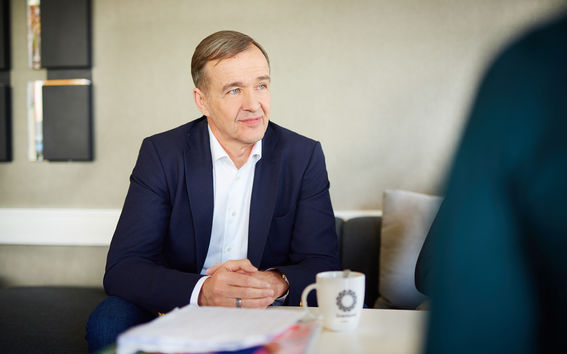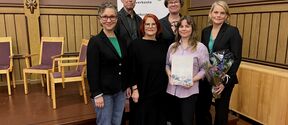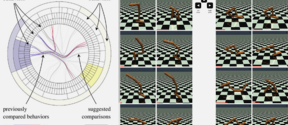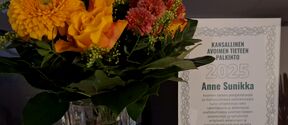Construction and real estate expert Pekka Metsi named Alumnus of the Year 2020

Granlund CEO Pekka Metsi has been named Alumnus of the Year 2020 by the Aalto University School of Engineering. He is the fifth alumnus to receive the honour.
'Pekka Metsi has worked persistently and extensively to promote development and research in the building services sector. He has years of experience in developing processes and business in both the real estate sector and the construction sector. The Granlund Group, which operates under Metsi's direction, is a major employer of engineering graduates. Currently, the group employs roughly 300 Master of Science (Tech.) graduates and ten Doctor of Science (Tech.) graduates. Through grants, Granlund has also supported the creation of numerous master's theses and doctoral dissertations in Aalto University. We also appreciate the contributions of Metsi and experts from Granlund to our research projects and teaching', says Dean Gary Marquis of the School of Engineering.
Among other projects, Metsi and Granlund are participants in Building 2030, a joint research initiative between Aalto University and companies from the construction sector. Building 2030 aims to prepare the field for the future changes brought on by digitalisation, rapid urbanisation and climate change – while also ensuring that the construction business remains on solid financial footing.
Pekka Metsi is the third CEO in Granlund's history. Before assuming the role of CEO in 2010, Metsi had worked at Granlund for many years as a subject-matter expert. He graduated from the mechanical engineering programme of the Helsinki University of Technology with a Master of Science (Tech.) degree on 9 June 1988, specialising in HVAC technology and construction management.
'Aalto University has a significant role in the development of Finland's technology sector – and many other sectors as well nowadays. At Granlund, we have always believed that innovation and development activities play a central role in business development as well. Thus, collaboration with Aalto has been a natural choice. In an expert field like ours, competence development continues over an entire career. Our field lacks doctoral graduates, an issue we have also tried to remedy through our joint efforts with Aalto University. One part of the problem is that graduate students from overseas have difficulties finding suitable employment in Finland, resulting in them taking their competence elsewhere – this is another challenge we have been working on. I hope Aalto will continue to host a strong real estate and construction cluster, with building services engineering as part of it. Right now, things look good', says Pekka Metsi.
Getting to know Pekka Metsi, Alumnus of the Year 2020
Could you tell us a bit about yourself and your career path? How did you decide on what to study?
My study and career path is not defined as much by goal-oriented and systematic orderliness as it is by taking opportunities and discovering good things through that. For a student who matriculated from Tapiola School with comprehensive math studies, I suppose Otaniemi was a fairly obvious choice. Many good friends from school were also making their decisions at that time, and many took the same path as myself. What attracted me to HVAC technology and construction management must probably have been their practicality and their impact on everyday life. I'm not entirely sure about how deep my thoughts were back then as a 20-year-old, though.
What are the biggest challenges in building services engineering?
Maybe the single greatest challenge facing building services as a field is its low profile, both within the construction sector and in the eyes of the so-called general public. In the construction sector, building services engineering is used to solve major challenges related to energy efficiency and carbon footprint. People spend the majority of their lives indoors, and indoor environments are at the core of building services – the current pandemic situation only emphasises this fact. Without functioning and easy to use ventilation, lighting and information technologies, our lives would be vastly different. Digitalisation can make the data flow from real estate, enabling a transformation in energy issues, real estate management and hopefully in the construction process as well. In other words, I see great opportunities instead of challenges. It takes a lot of hard work to keep up with the changes, of course.
Do you have any advice for students of technology and construction? What is worth studying, and what kinds of skills should today's student develop for the future?
I may not be the best person to give advice in light of my own academic performance, but I do have some ideas from what I've seen in working life. It is obvious that mastery – or at least an understanding – of data and digitalisation must be a part of all competence. It would be good to see engineers come to the construction sector with an understanding of technology, business models, processes and process management. I believe this kind of thinking has found more of a foothold through construction management. The Smart Building topic is already prominent at Aalto, and Aalto offers a great selection of studies in topics that are important from a building services engineering perspective. I hope students also receive the support they need to discover interesting new study paths. In addition to this, students should remember to have some fun as well, and this is something that I believe Aalto still knows how to do.
What was the best thing you learned during your studies from a career perspective?
It's difficult to name just one thing. Broader horizons and logical thinking. Getting an understanding of the laws of physics and then larger entities. Seeing the respect given to expertise was eye-opening. The union of science and business. Studying at Aalto is an excellent opportunity to build a professional network, not just within your own discipline but in any field. This is naturally emphasised in construction and real estate, as the two fields are first of all concerned with serving other disciplines. I picked up many good lessons.
Can you tell us a surprising fact about you?
Art and culture have always held an important place in my life. Even though I'm not an expert in the subject, I have a strong belief that the world becomes a better place when art and culture are given a strong base of support. Museums, exhibitions, modern art, theatre and high-quality films all produce wonderful experiences. In the past few years, we at Granlund have gotten more of an opportunity to build links between art and technology. Light and sound are also artistic tools, and this is definitely an area we want to expand on.
What do you consider the best type of climate action?
I do not think there's a single trick, instead I believe we can reach the best results through a comprehensive consideration of the climate issue on the part of both companies and individuals. We should account for the carbon footprint and carbon handprint of everything we do, and in the future these factors will direct our actions more and more. At the moment the direction is still relatively lax, but going forward there will be coercive aspects as well. Even though as an expert organisation Granlund has a relatively small carbon footprint, we must keep striving toward zero and show active leadership. We have a vast carbon handprint, however. We participate in thousands of projects annually, which means many opportunities to motivate our clients to invest in energy efficiency, renewable solutions, flexible consumption and others. Radical new innovations will be needed, but those take time. That's why everyday efforts and solving smaller problems are also crucial tasks.
Founded in 1960, Granlund is a strongly growing group of companies operating in the fields of construction and real estate with heavy investments into innovation and development activities. Its goal is to promote human well-being in the built environment. Granlund employs over 1 000 experts and the group's turnover in 2019 was €91.6 million. The group's areas of expertise are building services design; real estate, energy and environmental consulting; software; construction and supervision. Recent major projects include various hospital projects such as the HUS Siltasairaala hospital, Laakso Hospital, the Nova Hospital in Jyväskylä and the OYS2030 project of the Oulu University Hospital; data centre projects such as the Telia Helsinki data centre and the LUMI supercomputer; and individual megaprojects such as the Mall of Tripla and the West Metro.
Read more news

Kari Sajavaara Recognition Award to the Kielibuusti project for socially influential work related to languages
The award-winning project has addressed the topical debate on the opportunities available to immigrants in Finland to learn and study the local languages
Better AI models by incorporating user feedback into training
New research improves a popular method for fine-tuning AI models by 60% using visualization tools.
Viivi Prokofjev is Graphic Designer of the Year 2026
Art director, illustrator, and book designer Prokofjev's work combines tradition and craftsmanship with intuition and bold carnivalism.






